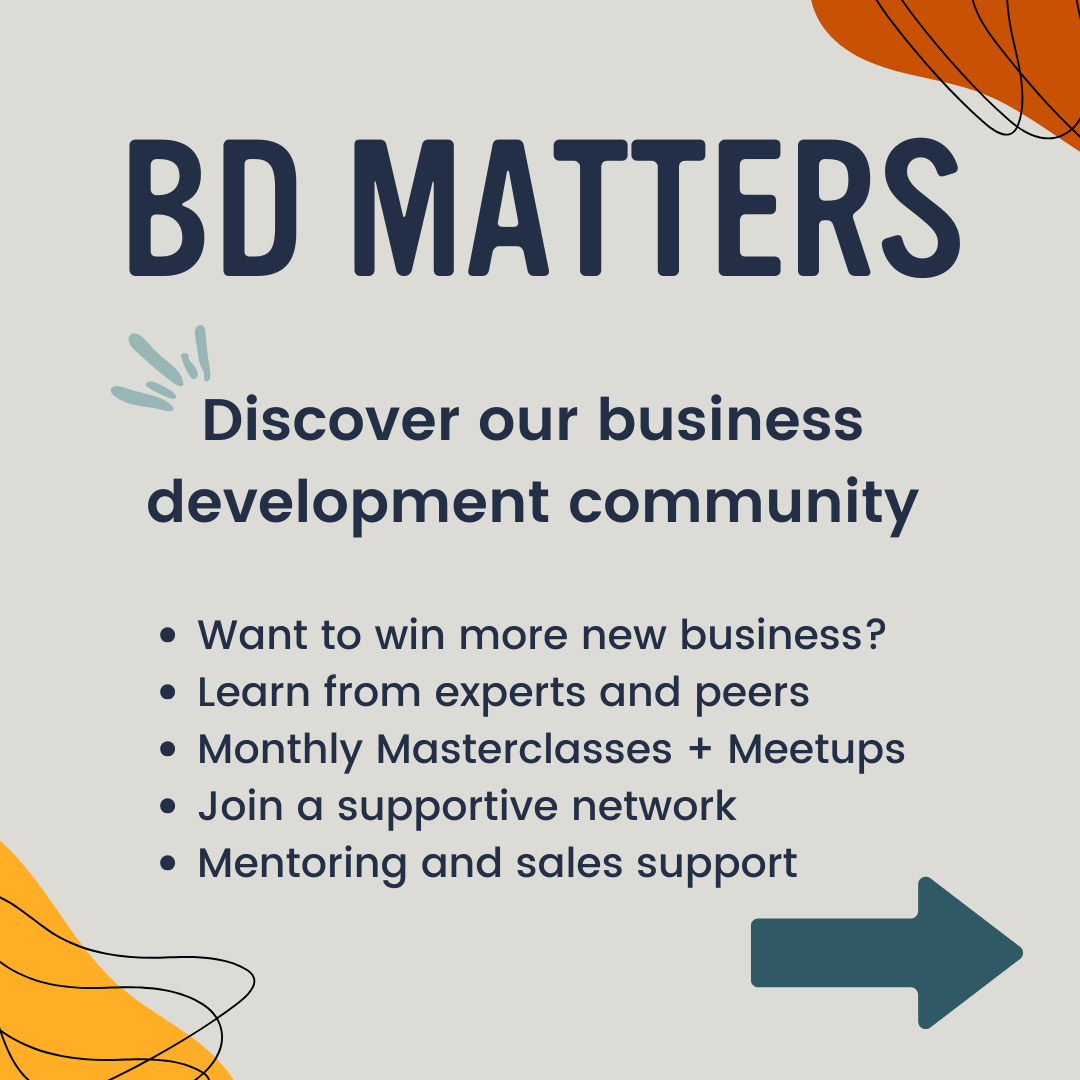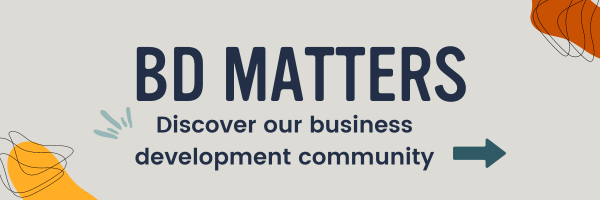
How agency folk can network like kings or queens (Essential Guide)
August 28, 2022
After two years of being on zoom calls and online events, meeting people in person and swapping the sweatpants for something slightly smarter is refreshing.
But two years of being out of the networking game means we’re a little rusty (conversationally and strategically), and some of us weren’t the best players before the pandemic either. That’s about to change.
This is your ultimate guide on effectively networking as an agency owner and maximising what you get out of it.
1) Get clear about why you’re networking
You know the benefits of networking in theory, but you need to be more strategic and connect your networking goals to your agency’s objectives. What are you hoping to achieve at this point?
Here are some examples:
- I want to know what prospecting techniques have worked for other agency owners and to share what’s working for me. It’s a chance for me to find solutions to some ongoing challenges we’re facing now.
- We’ve won a couple of clients in an industry that’s new to us. By attending specific industry events, I want to expand my knowledge, spot emerging trends and connect with key speakers so that our agency can better serve our new clients.
- Our clients love us but often ask, “do you also do [service]?” Instead of saying no, it would be great if we could find a partner agency to widen our offering. At a minimum, we could agree on a two-way referral.
- I’m an agency owner juggling it all. I want a carefully-curated network of people that I’m likely to need as my agency grows. This includes recruitment specialists, freelancers and marketing professionals.
2) Choose your events wisely
Now that you know what you want to get out of networking, ask your existing network for recommendations on networking events that have helped them with those (or similar) objectives. Be warned, if the people you’re approaching aren’t strategic networkers themselves, you might not get many helpful answers, but it’s a good place to start.
Browse the web for events that seem a good fit with what you’re trying to achieve but don’t get trigger-happy and sign up for everything that seems relevant. Be selective. You work long hours, and the last thing you want is to network at numerous events that don’t benefit you or your agency.
3) Ask for an attendee list
It might not always be possible, but some event organisers won’t mind sharing a guest list, or they may name-drop if you give them a call. Knowing who’s attending will help you decide if the event will be time well spent and helps you plan who you definitely want to speak with.
If you want to connect with the big names, will they be there? If you’re looking to widen your network and connect with companies you’ve not heard of before, are there enough of them attending and are they the right fit?
4) Connect with event organisers
Asking the organiser for an attendee list is a perfect opportunity to get to know the organiser. They can help introduce you to other attendees that you’re hoping to connect with and let you know of other upcoming events.
5) Get in touch with a few attendees before the event
Is there someone on the guestlist that you really want to connect with? Why not get in touch with them for coffee or drinks before the event? It’ll be easier to break the ice, and you can have a one-on-one conversation in a more relaxed setting.

6) Promote on social
Post on social media that you’re attending the event. This doesn’t have to be time-consuming and you can reshare promotional posts from the organisers, adding your own comment. Most events nowadays will have their own hashtag associated with them, so be sure to include them in your post.
Remember to capture photos during the event too, it makes for great content and helps with tip 22!
7) Don’t try to work the whole room
It’s far better to have a few solid interactions than to work the whole room and make meaningless connections. Set realistic expectations around how many quality connections you want to make.
8) Have a wing man/woman
It’s easier to meet new people when you have a buddy with you. Consider pairing up but don’t fall into the trap of talking to each other for the whole evening!
9) Don’t be afraid to join (or leave) groups of people
You’ll find many groups of people already in conversation, but don’t let that deter you. Walk up to them, smile and wait for a natural break in the chatter to introduce yourself.
If the conversation goes down a path that isn’t relevant to you, and it looks like it’ll stay that way, it’s okay to excuse yourself politely. Most people struggle with this and stay far too long in conversations that aren’t of any benefit. Time is precious – yours and other people’s, so it’s okay (and expected) to continue mingling.
10) Position yourself near the refreshments stand
If you find it challenging to enter conversations in progress, try standing near the refreshments stand. You’ll always get several people approaching this area, making it easier to initiate a conversation.

11) Ask people you know to introduce you to people they know
If you’re at an event and you see someone you know, ask them to introduce you to people they know. Networking through others is a great way to establish strong connections because there is already a mutual contact in common.
12) Consider their network
If you think someone can’t help you with your objectives, consider their network. They may not be able to help you directly, but someone in their network probably can. The only way to know is to build a rapport, provide context, and ask.
Don’t get too hung up on sticking with leaders of the pack either. For example, if you’re a new agency owner looking for some marketing advice, talking with the CEO of an agency might not be as helpful as speaking with their Marketing Manager.
13) Give and receive
Networking is a two-way street. If you’re willing to share contacts, resources, tips, successful techniques and more, you’re more likely to get that back in return. Be the first one to give, and you’ll quickly spot the people willing to help back (focus on getting more of them!).
14) Have your elevator pitch ready
You’ll inevitably have to introduce yourself and explain what you do, so it may as well be said succinctly, with conviction and in a way that piques interest.
Having your elevator pitch ready will also reduce any nerves during first-time introductions, and it’s a great segway into allowing people to learn more about your agency and what you offer.
15) Don’t sell
You’ve got your elevator pitch ready, but that doesn’t mean this is an opportunity to start selling your services. Treat new network relationships as you’d treat new friendships by building a rapport and establishing a comfort level.
16) Truly listen
We all know someone who likes to dominate the entire conversation, and it can get really irritating. Practice actively listening when someone is speaking.
Some people continue talking out of nervousness. If that’s you, be mindful of it and break the loop by having a few questions ready such as “so, what motivated you to run an agency?” and wait for the response.
While it’s important to listen, it’s also essential you don’t remain the listener and can contribute to the conversation. The point of networking is to mutually exchange information.
17) Talk about their interests and find some common ground
Connecting beyond a strictly professional level doesn’t only help with building a good personal bond; it expands what you can bring to the table as the relationship grows. For example, sharing an interest in tech innovation might lay the foundation for a successful partnership down the road.

18) Be (partially) up-to-date on current affairs and industry news
You’re busy and absorbing news on the go, so you might not be fully up-to-date with everything happening in the world and in your space. That’s okay because most people love to explain, but having some topical news under your belt is key.
Not only does it highlight the intelligent professional you are, but it’s also a great default for when you need to make some small talk – much better than talking about the weather!
19) End on a positive note
A lot of the stuff reported on the news is grim and negative (and we’ve had enough of that in recent years), so end your conversations on a more positive note.
20) Why the cliche “be yourself” actually works
Networking events are all about relationship building, and you can’t build an authentic relationship if you’re pretending to be something you’re not or pretending to know something you don’t.
If someone senses you’re not being genuine, they won’t want to do any future business with you. For those who don’t sense it, it will just exhaust you to sustain the version you’ve created. When you’re being your genuine (but professional) self, you’ll attract people you can actually get along with.
21) Stay organised
You’ll struggle to leverage your network if you can’t remember who they are, what they do, where you met and what you discussed. Even if you think you’ll remember individuals in your head, having them all sitting in a dedicated place with all their details logged is better and smarter.
Save notes on your phone during the event but make it a habit to transfer the details into a CRM. Tag or label them as “networking connections” or similar so that you can avoid sending them anything that they didn’t opt-in for.

22) Find a reason to follow up
Remember, you’re not following up to provide a sales pitch but to start nurturing your new-found connections.
If they shared some helpful advice, you could drop them a handwritten thank you card or simply a “nice to meet you” note.
You could also share any photos you have of the event with them so that they can use them as content material for their personal or their company’s social media channels.
23) Strengthen your weakest connections and nurture your new ones
Remember, while building new connections, you’re likely to have some powerful contact sitting in your contacts list from before. You must maintain a relationship with them by checking in.
Relationships need nurturing to grow. Connect with people on LinkedIn immediately and look at their profiles to learn more about them. Having them on LinkedIn also means you’ll be able to spot their key successes, such as promotions and can drop them a congratulations card.
24) Be a regular
You’ll get better at networking if you regularly keep it up. The more active you are, the more people will remember you and your agency. If you build a reputation as a helper, you’ll find people who want to help in return and support you with your goals.

25) Know what event formats work for you
You’re more likely to keep up networking if you enjoy it and if it conveniently fits into your schedule, so consider what type of event appeals to you the most. We’ve listed the most common types of events here:
Happy hour networking meet-ups
They’re easy to pop around to after work, and you’ll catch people unwinding with a pint or two.
Breakfast networking
If you like carving out time for breakfast (or a caffeine boost), breakfast networking would be ideal for you. Since it’s before the working day begins, most people are less distracted and more receptive.
We host breakfast roundtable events at Gray Matters. We call them breakfast rehabs because they’re an opportunity for agency owners and anyone working in new business to come together, share their challenges and find solutions.
Roundtable talks
The great thing about roundtables (which is why we do them) is that it allows for open discussions from people in similar situations to exchange ideas and get an external perspective from industry peers.
If you’re having trouble prospecting, working on a tricky section in a proposal, or dealing with a difficult client, roundtable events are an ideal environment to get some help.
Industry events with speakers
If you prefer more listening and learning, speaker events are great. You have the chance to absorb some knowledge and can save networking until the end.
All-day conferences
Often attracting a large number of people, it’s an excellent opportunity to attend different workshops, build up your contact list and booth hop from one to the next.
Single workshops
These are great for people new to networking as they allow you to work in small groups without being thrown in at the deep end. If you know someone in your team who is a little shy about networking, workshops are a great way to help build their confidence.
Bottom line
One of the most beneficial things agency folk can do for their agency is to build and use strategic networks. To build a strong network, you’ll want to establish what you’re trying to achieve beforehand, find the right people to add to your network, nurture them, and leverage external ties when needed. As any mutual relationship goes, be receptive to what they may need from you and help out where you can.
What are some of your top networking tips?
Email [email protected] and we’ll get them on here with a credit to you and your agency.

